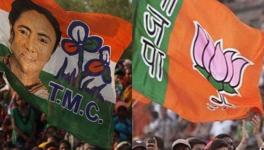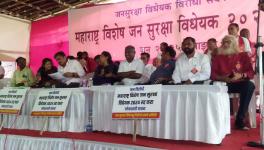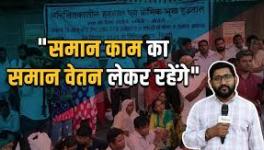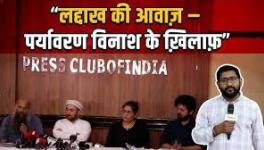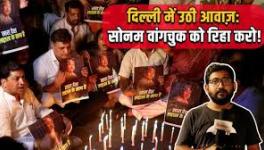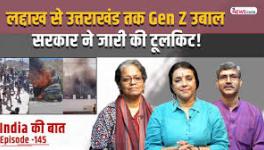The Golden Cage of Stardom
In the end, then, Mumbai got to see My Name is Khan and the Sena had to retreat, tail between legs
Even 24 hours before the film was finally exhibited, this seemed unlikely. The state government had advised cinema owners to show the film keeping the first three rows empty, presumably to prevent hooligans from damaging the screen, and to employ private security guards. Cinema owners asked, reasonably, who was going to pay for those empty rows and extra security? And what if someone got up from the fourth row and damaged the screen? What if there was damage, not to the screen, but to the seats? On the eve of the release, it appeared that the film may not release in Mumbai at all.
This was followed by late-night confabulations. Shah Rukh Khan, in Berlin to promote the film at the Berlinale, held a video conference with the city’s multiplex owners, and it is reasonable to assume that he or someone on his behalf lobbied the government as well. The film was finally exhibited, prompting another poison editorial by Bal Thackeray.
It is unquestionable that the people of Mumbai deserve much credit for the film finally being exhibited on release date. They lined up outside cinema halls in large numbers from morning, and this gave confidence to the owners. The state government too got into the act, even if very late, with a minister himself going around cinema halls to oversee security and give confidence to owners. The rest of us heaved a collective sigh of relief.
That the people of Mumbai showed collective will does not cause surprise. That the government of Maharashtra trundled along confusedly does not cause surprise either. That Sharad Pawar, in a game of one-upmanship with the Congress, thought it fit to offer an olive branch to a thoroughly isolated Bal Thackeray, promising him a presentation on the IPL, causes no surprise either. What does cause surprise is that Shah Rukh Khan stood his ground and refused to apologise.
We think of film stars as powerful people. We see them endorsing this or that brand, we see them supporting causes like AIDS awareness or animal rights, we see them hogging television and newspaper space with platitudes on everything ranging from global warming to the cuteness quotient of Barack Obama’s smile. And yet, when it comes to real opinions about contentious issues, film stars are, as a general rule, conspicuously silent.
Strong political opinions are inimical to carefully crafted public personas. On these personas rest fortunes. When Tiger Woods was found out to be a serial philanderer, his persona, which rests critically upon constructing an image of a man so driven that nothing on earth would shake his focus, a man who never deviates from the straight and narrow, was shattered at one go. He earns many times more from endorsing brands that have built his image than he does from the sport he plays better than anyone else on the planet. If his marriage shatters, this image shatters. No wonder he’s offered his wife millions to stay married to him!
Stars are prisoners of a golden cage. The bigger the star, the more fragile the cage.
Think of Amitabh Bachchan. When his wife and MP Jaya Bachchan upheld north Indians’ right to speak Hindi in Mumbai, and earned the ire of both the Thackerays, uncle and nephew, Amitabh Bachchan apologized on his wife’s behalf. In the recent episode targeting Shah Rukh Khan, Amitabh lavished praise on the elder Thackeray, and Jaya, in response to a question about why the film fraternity was silent, pointedly said that Bollywood came together for “national causes.”
Shah Rukh Khan is not only one of the biggest stars of the film industry, he is also, along with Karan Johar, co-producer of the film under attack and, lest we forget, owner of an IPL franchise. Hundreds of crores ride on him. It is reasonable to assume that had he gone to Bal Thackeray and offered something like an apology, the Sena would have relented. Thackeray is a bully and like most bullies, he likes his ego massaged. In the past, every single time he targeted a film, the producer went to him and paid obeisance, and the screening went ahead. In one famous case, Mani Ratnam even showed Thackeray his film Bombay before it was released and agreed to make two cuts. More recently, when Raj Thackeray’s goons targeted Wake Up Sid because in one sequence the characters referred to “Bombay” and not “Mumbai,” the producer, Karan Johar, met Raj Thackeray and agreed to re-dub the sequence. (Whether it was in fact re-dubbed or not is scarcely important. It is also telling that the same sequence referred to “Calcutta” rather than “Kolkata,” without provoking any reaction at all.)
In other words, faced with possible financial loss running into crores and the prospect of resolving matters if only he agreed to do what many others before him had done, Shah Rukh Khan refused to bend. For many, whether they like him as an actor or not, the figure of Shah Rukh Khan has become far too synonymous with neoliberalism. He will endorse anything – women’s beauty soap and men’s fairness cream included – and will dance at weddings, if only the fee is right. He became the face of candy-floss NRI romances. And he was among the first stars to jump on the IPL bandwagon. It is possible that Thackeray’s tirade against Mukesh Ambani and Sachin Tendulkar and the revulsion it provoked emboldened Shah Rukh Khan to take a stand. Whatever it is, his fans can hardly complain – for once, it became politically correct to support Shah Rukh Khan!
Hindi film stars taking a stand on a political issue is a rarity. Many of them have joined political parties, of course, but barring an exception like Sunil Dutt, most lapse into silence at best, inanities at worst. Dharmendra, an MP in the last Lok Sabha, remained absent most of the time, as did Govinda. And even Sunil Dutt, otherwise secular, publicly acknowledged Bal Thackeray’s help when it came to helping his wayward son. Sanjay Dutt, in turn, was pulled into campaign by Amar Singh in the last election, only to resign from the party when his mentor fell foul with Mulayam Singh.
Every once in a while, there is a feeble exception. A few years ago, Aamir Khan came out in support of the Narmada Bachao Andolan. It was cynically rumoured that his stand was a subtle way of promoting his film Rang De Basanti, which exhorted the youth to take a stand against corruption. In any case, his stand earned him the ire of the Gujarat Chief Minister, and goons of the Hindu Right threatened violence against his film Fanaa. Some screenings were disrupted, but the film was shown in several cities in Gujarat. Aamir Khan, Coca-Cola’s face in India, has never since taken a stand on a political issue. In fact, when Shah Rukh Khan was under fire recently, he chose to remain silent. That the two stars don’t share good vibes is well known. But then Shah Rukh Khan doesn’t share good vibes with Salman Khan either, but that didn’t prevent Salman, otherwise seen as being brash and immature, from publicly supporting Shah Rukh.
Earlier, in 2000, the crew of Deepa Mehta’s film Water was attacked on location in Varanasi. On that occasion, the film crew had secured all the requisite permissions from the concerned authorities before commencing the shooting. In an unprecedented action, the script of the film was shown to the I&B Ministry of the BJP-led central government, which cleared it, and in fact appointed a liaison officer to oversee the shooting. None of this saved the film. Eventually, it had to be shot, semi-secretly, in Sri Lanka with a different cast. A few years before this, the same director’s Fire was threatened as well, and a few screenings disrupted. In neither of those cases did any big film star come out in support of Deepa Mehta or her films. And no big star came out in support of Dilip Kumar either, when the Shiv Sena targeted him in 1999 because he had accepted an award from the Pakistan government.
It is of course one thing to take a stand when you are under attack. It is quite a different thing to speak out against injustice and violence when it does not, in any way, directly affect you. Taking a stand of this kind, putting your professional well-being on the line, is altogether too rare in the Hindi film industry. In fact, I can only think of one significant instance in the last quarter century.
In January 1989, just days after Safdar Hashmi was killed, Shabana Azmi electrified the audience at the International Film Festival in Delhi when, in the presence of ministers and senior bureaucrats, she ignored the compere Kabir Bedi’s question about New Wave directors and chose instead to read out a protest note against that killing. What was remarkable was that the note explicitly named the Congress party, then in power at the centre. As she began reading, the audience at Siri Fort Auditorium broke out in spontaneous applause, but it was reported that the I&B Minister was terribly upset. If memory serves, some columnists too opined that it was inappropriate of Shabana Azmi to use the platform of an international festival to voice her opinion.
On the contrary, using public platforms to voice political concerns is altogether too rare. The one recent case that comes to mind is that of the American documentary filmmaker Michael Moore, who won the Oscar for his Bowling for Columbine, at the height of the Iraq war in 2003. The Oscar awards ceremony commands a global viewership of many millions. It was only to be expected that given the subject of his film, Michael Moore, if he won the award, would make an anti-war speech critical of the US President George Bush. The organizers of the award ceremony could not prevent Moore from getting the award, but they could do something about his speech. As soon as he got to the contentious part of his speech – “we live in the times where we have fictitious election results that elects a fictitious president. We live in a time when we have a man sending us to war for fictitious reasons. . . . Shame on you, Mr. Bush, shame on you” – the band started to play, drowning out his words.
As it happened, he was not the only winner to speak up that day. But the others spoke guardedly. “Whoever you believe in, whether it is God or Allah, may he watch over you and let’s pray for a swift resolution,” said best actor winner Adrien Brody. Best supporting actor winner Chris Cooper also made a low key statement: “In light of all the troubles in this world I wish us all peace,” he said.
Exactly thirty years earlier, in 1973, the same awards function was used to stunning effect by one of the biggest movie stars of all time: Marlon Brando. He was nominated, along with Michael Caine, Lawrence Olivier and Peter O’Toole, for the best actor award. By this time, Brando had become active in the native Americans civil rights movement. Among other things, he was deeply disturbed at the portrayal of native Americans in Hollywood films. When Roger Moore (who that year played James Bond for the first time) and Liv Ulhman announced Brando’s name, a young native American woman, Sacheen Littlefeather, walked up to the stage and announced that Brando was refusing the award in protest against atrocities against her people. Some in the audience clapped, many booed. Brando had given her a 15-page speech to read, but the producer of the show, who met her backstage, threatened to have her arrested if she read it. Interested readers can see the footage of that remarkable gesture here.
Brando’s gesture was brave. But the real heroes of Hollywood were those who had earlier refused to testify, or to name others, when questioned by the notorious Un-American Activities Committee in a witch hunt we know as McCarthyism. This committee, set up in 1937, began investigating alleged communists in Hollywood in 1947. Ten of those accused – Herbert Biberman, Lester Cole, Albert Maltz, Adrian Scott, Samuel Ornitz, Dalton Trumbo, Edward Dmytryk, Ring Lardner Jr., John Howard Lawson and Alvah Bessie – refused to answer any questions. Known as the Hollywood Ten, they were found guilty of contempt of Congress and each was sentenced to between six and twelve months in prison.
Not everyone was so courageous. Elia Kazan, the director of A Streetcar Named Desire, amongst the early films that made Marlon Brando a superstar, cooperated with the committee and named his former comrades. This earned him widespread revulsion. Out of that guilt came his best-known film, On the Waterfront, about a heroic youngster who refuses to stay silent and dares to “name names.” The screenplay is credited to Budd Schulberg, who, like Kazan, also appeared before the committee and ratted on former comrades. Interestingly, the original screenplay of the film was written by the playwright Arthur Miller, who was also summoned by the committee and refused to name names. In all, over 320 Hollywood artistes – including Lillian Hellman, Dashiell Hammett, Clifford Odets, Larry Parks, Louis Untermeyer, Arthur Miller, Pete Seeger, John Garfield, Howard Da Silva and Richard Wright – were questioned, found guilty, blacklisted, and prevented from working for various lengths of time. Some found their careers entirely ruined.
Today, as we acknowledge Shah Rukh Khan’s principled stand, it is useful to remind ourselves that others had fought fiercer battles in tougher conditions at far greater personal cost. Golden or otherwise, a cage is a cage, meant to be broken out of.
Get the latest reports & analysis with people's perspective on Protests, movements & deep analytical videos, discussions of the current affairs in your Telegram app. Subscribe to NewsClick's Telegram channel & get Real-Time updates on stories, as they get published on our website.












